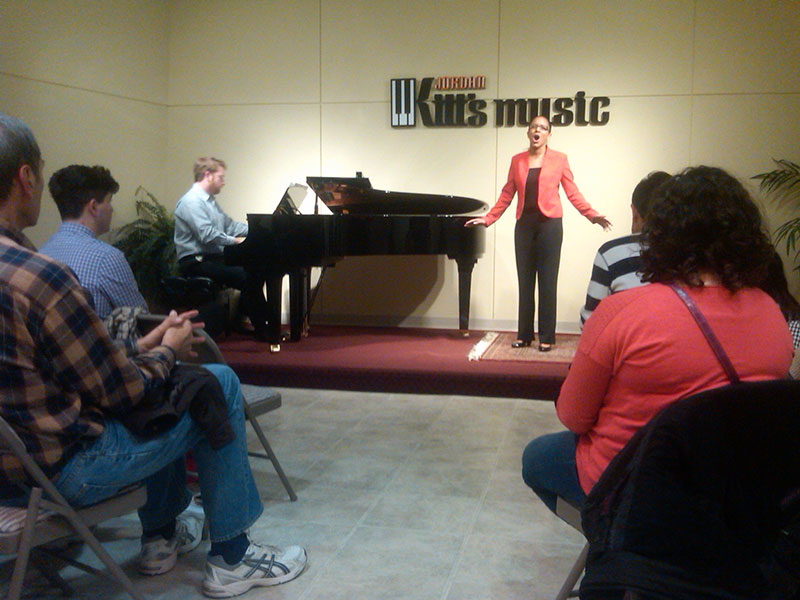
Perform a Google search on “benefits of music education,” and you will find countless explanations of the societal and personal advantages to those students fortunate enough to learn about music in their youth. However, I want to explain to you the top six reasons why I think a music education–specifically learning how to play the piano–should be part of every child’s education beginning at the age of six.
1) Developing Coordination – The child who learns to play the piano is also developing fine motor skills, dexterity, and hand-eye coordination in the process. This has been shown to enhance performance in other areas such as athletics.
2) Increasing Concentration – Participating in a half-hour weekly lesson and practicing every day, a child is intensely focused on the complexities of rhythm, melody, harmony, technique, and theory. This requires spatial reasoning, critical thinking, and creativity, which provide a rigorous mental workout! The increased concentration often results in helping a student to study more effectively, resulting in better grades in school.
3) Building Self-Esteem – There is such a quality as “talent” for playing the piano, but not every child is endowed with this precious gift. However, making the effort to overcome the mental and physical challenges of each new lesson creates feelings of accomplishment and ongoing success, which long-term is building self-esteem. The child who enters middle school years with a strong sense of self-worth fares far better in what can often be a hostile social environment.
4) Acquiring a Well-Rounded Education – More and more, colleges must choose from an applicant pool of academic over-achievers with impressive SAT scores and GPAs over 4.0! What makes one candidate more appealing than another of equal academic success is his/her well-roundedness. Are they involved in their community? Do they play sports? Do they play at least one musical instrument? In addition to the food pyramid steering us to optimal nutrition for our bodies, we must also remember to nourish our souls by feeding our children a healthy dose of the arts every day.
5) Experiencing Future Math/Science Success – This one is a little tough to explain without getting a bit technical–and I am no neuroscientist–but the way I understand it, the grey matter in the brain of a six-year-old child is far more malleable than that of a child who is 16. When spatial reasoning is developed at age six, as happens with the study of music, complex synapses (information transmitters) fire in the brain and forge pathways through the grey matter resulting in “hallways” or “channels” that can be used again later when that child is studying such complex subjects as advanced math and science. If the 16-year-old has no prior pathways forged, the synapses have a more difficult job firing through the grey matter of the brain. The bottom line as shown by research is that children who learn to play the piano at a young age perform better at high-level math and science later in life.
 6) My favorite reason: Producing ENJOYMENT! – It is very important for children to have fun too! It is joyful to make music. The ability to play music fosters a deeper appreciation for listening to music of all kinds. In this age of instant gratification, electronic gadgets, and countless media distractions, it is refreshing to find an activity in which great patience and persistence are required. Playing a keyboard instrument carries forth a Western tradition dating back over 400 years!
6) My favorite reason: Producing ENJOYMENT! – It is very important for children to have fun too! It is joyful to make music. The ability to play music fosters a deeper appreciation for listening to music of all kinds. In this age of instant gratification, electronic gadgets, and countless media distractions, it is refreshing to find an activity in which great patience and persistence are required. Playing a keyboard instrument carries forth a Western tradition dating back over 400 years!
Your child’s music education can begin with initiating contact today along with the purchase or rental of a fine piano… Allow us to utilize our experience and expertise in pianos sales to also guide you through that process. We hope you’ll provide the gift of music for your child — it’s the gift that lasts a lifetime!








 6) My favorite reason: Producing ENJOYMENT! – It is very important for children to have fun too! It is joyful to make music. The ability to play music fosters a deeper appreciation for listening to music of all kinds. In this age of instant gratification, electronic gadgets, and countless media distractions, it is refreshing to find an activity in which great patience and persistence are required. Playing a keyboard instrument carries forth a Western tradition dating back over 400 years!
6) My favorite reason: Producing ENJOYMENT! – It is very important for children to have fun too! It is joyful to make music. The ability to play music fosters a deeper appreciation for listening to music of all kinds. In this age of instant gratification, electronic gadgets, and countless media distractions, it is refreshing to find an activity in which great patience and persistence are required. Playing a keyboard instrument carries forth a Western tradition dating back over 400 years!